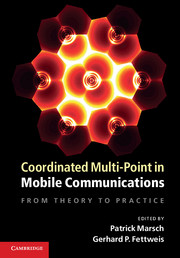Book contents
- Frontmatter
- Contents
- List of Contributors
- Acknowledgements
- List of Abbreviations
- Nomenclature and Notation
- Part I Motivation and Basics
- Part II Practical CoMP Schemes
- Part III Challenges Connected to CoMP
- Part IV Performance Assessment
- 13 Field Trial Results
- 14 Performance Prediction of CoMP in Large Cellular Systems
- Part V Outlook and Conclusions
- References
- Index
14 - Performance Prediction of CoMP in Large Cellular Systems
from Part IV - Performance Assessment
Published online by Cambridge University Press: 05 August 2012
- Frontmatter
- Contents
- List of Contributors
- Acknowledgements
- List of Abbreviations
- Nomenclature and Notation
- Part I Motivation and Basics
- Part II Practical CoMP Schemes
- Part III Challenges Connected to CoMP
- Part IV Performance Assessment
- 13 Field Trial Results
- 14 Performance Prediction of CoMP in Large Cellular Systems
- Part V Outlook and Conclusions
- References
- Index
Summary
While Chapter 13 has shown that various CoMP concepts discussed in this book do indeed work in practice and yield gains that match fairly well to theoretical predictions, any field trial result is of course always limited to a particular, not necessarily representative, scenario, and, more importantly, to a very limited number of terminals. Before an operator invests into the technology and infrastructure required for certain CoMP schemes, however, he will want to assess their performance in large-scale systems with a large number of mobile terminals and potentially complex traffic models.
In this chapter, we hence want to discuss how system level simulations can be conducted in order to assess CoMP performance in large system contexts at reasonable complexity. First, Section 14.1 introduces the standard assumptions and simulation methodology used by 3GPP for the simulation of LTE and LTE-A schemes. Section 14.2 then shows how channel sounding measurements or ray-tracing in a 3D city model can be used to parameterize channel models, especially as the simulation of CoMP systems shifts the focus to different largescale parameters than that of non-cooperative systems. The chapter is concluded with system level results on a subset of the uplink and downlink CoMP concepts covered in this book in Sections 14.3 and 14.4, respectively.
Simulation and Link-2-System Mapping Methodology
Before any mobile communication system is deployed in the real world, a lot of design decisions have to be taken, and the cost of features have to be balanced with the gain that they promise.
Information
- Type
- Chapter
- Information
- Coordinated Multi-Point in Mobile CommunicationsFrom Theory to Practice, pp. 367 - 408Publisher: Cambridge University PressPrint publication year: 2011
